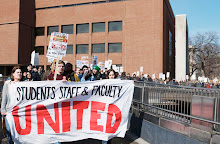The UC Faculty Senate passed this resolution last fall, but it merits consideration now for two reasons. First, it shows that Faculty Senates can play a more active and publicly critical role of administration. (Although alas in the end, they also have no power to bind the administraiton...) Second, they took the bold step of putting a frank discussion of athletics on the agenda and propose a creative solution for aligning athletics with the University's academic mission. The resolution is reproduced in full (excluding footnotes) below.
***
Resolution on Intercollegiate Athletics at UC Berkeley
Whereas, Although it is widely believed that the Department of Intercollegiate Athletics (DIA) earns a profit for the Berkeley campus, its financial statements reveal that it significantly outspends its revenues every year, depleting precious campus resources;
Whereas, For the most recent 5-year period for which the DIA has released detailed data (2003-08) its cost to campus has been at least $10 million every year except for 2007-08 for which the cost was $7.4 million;
Whereas, Current estimates for the most recent fiscal year (2008-09) indicate that the cost to the campus is expected to be a record high of approximately $13.5 million and is expected to be even higher for the current fiscal year (2009-10);
Whereas, The DIA has cost the campus approximately $160 million since 1991;
Whereas, The DIA is authorized to operate as an Auxiliary Enterprise on a financially self-supporting basis;
Whereas, The DIA’s services are provided directly to only approximately 900 among 35,000 students (or 2.5%) at the Berkeley campus;
Whereas, Student-athletes are given a wide range of special privileges and perquisites not accorded to regular students, including course enrollment priority, exclusive tutoring, exclusive conditioning and practice facilities, subsidized superior residence facilities, personal transportation, hotel stays before home games, and more;
Whereas, The Berkeley campus is about to incur a much larger $457 million debt risk through external financing of $321 million4 to renovate the California Memorial Stadium and $136 million to construct the Student-Athlete High Performance Center (SAHPC), a facility with access that will be restricted to only 450 student-athletes, less than 1% of the students, staff, and faculty on campus;
Whereas, This $457 million dollar debt is being arranged to be repaid by the DIA, despite the fact that the DIA operates at a loss;
Whereas, Recreational activities and facilities, which could benefit the mental and physical health of all students, staff, and faculty in the UC Berkeley campus community,are underfunded and understaffed;
Whereas, The scholarly literature shows that it is a misconception that intercollegiate athletics earns money for universities and even the NCAA reports that increased spending on athletics does not increase alumni donations to the university (which prompted the NCAA president to advise college presidents to reconsider their institutional spending on sports);
Whereas, Refereed journal articles conclude that the evidence shows increased giving to athletics often brings with it a decline in academic fundraising at the same institution;
Whereas, Only one-third of Cal’s men’s basketball players and one-half of the football players graduate10 and Cal’s football graduation rate is near the bottom of the Pac-10 Conference;
Whereas, The second largest line item (after health care) in the annual student registration fee (paid by both undergraduate and graduate students) is for Intercollegiate Athletics, amounting to $2 million annually, provided to the DIA by non-athlete students to benefit the approximately 900 athletes and to subsidize ticket prices for event attendees;
Whereas, Competitive intercollegiate athletics is not part of the core UC mission of “undergraduate education, graduate and professional education, research, and other kinds of public service, which are shaped and bounded by the central pervasive mission
of discovering and advancing knowledge”; and
Whereas, The university is facing historically severe financial pressures, putting core-central activities at risk;
Be it therefore RESOLVED, that:
1. The faculty recommends that the Chancellor put Intercollegiate Athletics on its intended self-supporting basis, taking immediate action to effect the following:
a. All funding of Intercollegiate Athletics from campus subsidies and the use of student registration fees cease immediately (or as soon as possible to the extent permitted by existing contract constraints).
b. The DIA cease annual deficit spending and the Berkeley campus not permit Intercollegiate Athletics to spend beyond its actual annual direct revenues.
c. All DIA coaching compensation be subject to full furlough unless the DIA has a net annual profit based on direct revenues large enough to cover the furlough amounts.
2. The faculty recommends that the Chancellor take immediate action to ensure that Intercollegiate Athletics develop a viable plan, by the Spring meeting of the Berkeley Division of the Academic Senate, to retire the cumulative debt to the Berkeley campus.
3. The faculty recommends that the Chancellor and the development staff urge donors to prioritize academics at the Berkeley campus.
4. The Academic Senate establish a Senate Intercollegiate Athletics Oversight Committee composed solely of Senate members to oversee the DIA operations, to promote transparency and clarity, and to confirm the satisfactory accomplishment of the above items.
Respectfully submitted,
Alice M. Agogino, Professor of Mechanical Engineering
Brian A. Barsky, Professor of Electrical Engineering & Computer Sciences
Leslea J. Hlusko, Associate Professor of Integrative Biology
Jere H. Lipps, Professor of Integrative Biology
Margaretta Lovell, Professor of Art History
Laura Nader, Professor of Anthropology
Michael O’Hare, Professor of Public Policy
Loy Volkman, Professor Emerita of Plant and Microbial Biology
***
Since last fall, the Coalition on Intercollegiate Athletics (COIA) has joined forces with the Academic Senate at University of California Berkeley and the Knight Commission to propose that institutions of higher education have meaningful faculty committees appointed by faculty to oversee academic and budgetary issues of NCAA sports programs. They have drafted a model resolution that is even stronger than that originally proposed in the fall:
1. Faculty Governance
(a) The Faculty recommends that the University recognizes and supports a Campus Athletics Board (CAB) or equivalent, as mandated by the NCAA. The CAB shall have a voting membership composed solely of faculty members and shall be authorized, in conjunction with the University Administration, to establish policy and to oversee the athletic department's operations with regard to the following:
(i) Promote transparency and clarity in all matters affecting the academic mission;
(ii) Assist the athletic department in making decisions that are in concert with the overall academic mission of the University;
(iii) Protect student athlete welfare; and,
(iv) Confirm the satisfactory accomplishment of the academic and financial items below.
2. Academic
(a) The Faculty recommends that in order to maintain academics as the number one priority for all students, students who also participate in athletics maintain a cumulative G.P.A. of 2.0 in order to continue participating in intercollegiate athletics.
(b) The Faculty recommends that the University establish a policy which ensures that athletic contests and athletic travel be scheduled to minimize lost class time, including final exam periods.
(c) The Faculty recommends that all other athletically related activities (e.g., formal and informal practices, team meetings, and any activities at which the attendance of student-athletes is required) be scheduled outside the prime times for academic classes.
3. Finances
(a) The faculty recommends that the University President or equivalent put the Athletics Department on a self-supporting basis, and implement the following:
(i) The Athletics Budget shall receive no base funds from the general education fund. Any annual cash support to the Athletics Budget from the general education fund shall be approved by the Athletics Oversight Committee and the faculty senate, as well as by the University's governing board and through the normal budgeting
procedure.
(ii) The Athletic Budget shall be integrated with the academic budget and follow the same processes and procedures; and,
(iii) The Athletics Budget shall receive support from student fees only as voted by the student body.
4. University Advancement
(a) The University Administration and the Athletic Department shall continually urge donors to prioritize academics at the University campus.
Saturday, May 29, 2010
Subscribe to:
Post Comments (Atom)


No comments:
Post a Comment